Who Makes WUD Work?
Ten committees and six Hoofers clubs make up the Wisconsin Union Directorate (WUD), which is run by students who plan, program and promote hundreds of recreational, art, community service and cultural events on campus each year. Besides being a fun experience, WUD allows students to step into major leadership roles to run the committees. Hours of work and planning go into making a WUD committee tick, and we are fortunate to hear from some of the awesome student directors of WUD to learn about how they’re improving people’s lives outside of the classroom.
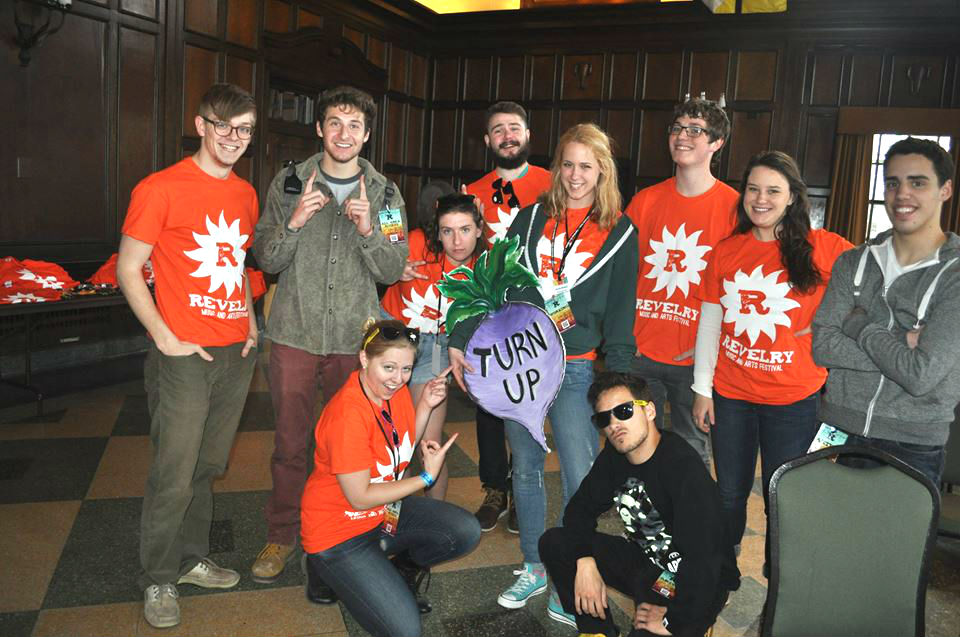
WUD Music “turns up” for another successful Revelry Music and Arts Festival.
First up is Sassi Ruenger, 2014-’15 Director of WUD Global Connections Committee and a senior at UW who loves the Terrace in the summer as her favorite Union hangout.
Next is Tori Dexter, also a senior and 2014-’15 Director of WUD Music. Tori loves hanging out in the Director’s Lounge on the fifth floor of Memorial Union in the winter to enjoy to beautiful views of frozen Lake Mendota.
Third is Jordan Foster, a sophomore and 2014-’15 Director of WUD Performing Arts. She loves the views from her third floor Memorial Union office, where she can check out the Terrace and spend time with coworkers.
And last but certainly not least is Jack Comeau, a junior at UW, 2014-’15 Director of WUD Society and Politics and newly elected president of WUD for 2015-’16! Jack had to pick Der Rathskeller as his favorite Union hangout, because of the delicious fries. Read on to hear what these student leaders had to say about their successful experiences at WUD.
TV: What drew you to your specific committee?
Tori: I went to a concert in The Sett and saw all these people standing in a prime spot by the soundboard where they could see over the massive crowd. Naturally, I also wanted to be standing there, so I strolled over and asked them how they got those spots, and they told me they were volunteers with WUD Music. I memorized the name of that student org and went to the kickoff meeting the next semester, sitting nervously in the back the entire time. I was so nervous that I almost didn’t come back, but there was a really cute guy who came to the meetings, so I decided to give it one more shot and thank god I did, because I promptly found out that the committee had just booked one of my favorite artists of all time and from that moment on, I was hooked.
Jordan: I’m a jazz musician and performing arts enthusiast.
Jack: My majors, Political Science and International Studies, overlap with the programming and speakers brought to campus by WUD Society & Politics.
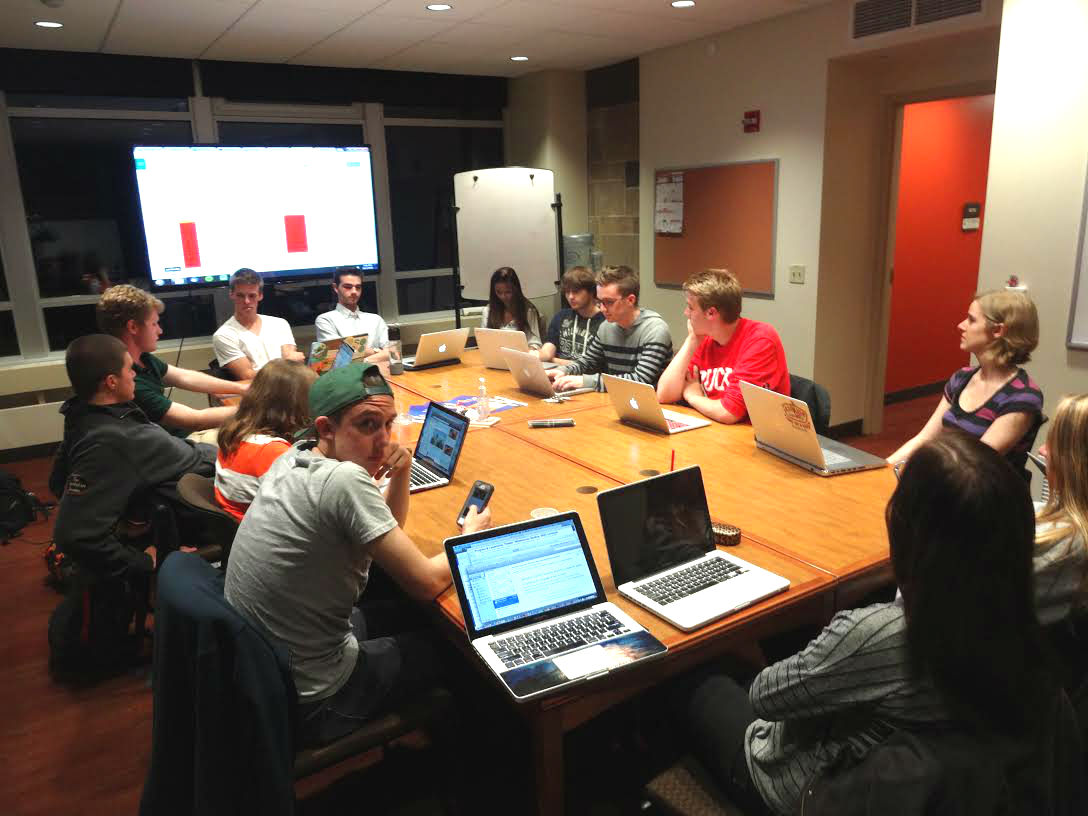
WUD Society and Politics members hash out plans and ideas at a meeting.
TV: Walk us through how you became director.
Sassi: I vaguely knew what WUD was because a friend was a director of one of the committees. I then saw an email from the directorate saying that application deadlines had been extended, and on a whim I applied. I’m unusual because I was not part of WUD before I became a director.
Tori: I’d been on the committee for two years, and had been a member of our marketing subcommittee, a summer coordinator and an assistant director. I absolutely loved everything about booking, running and attending shows and I’d wanted to be a director since about my second day as a committee member, so I started preparing my essays and resume in December so when the applications came out in February, I pounced. I remember finding out I got the job the day before leaving the country for spring break, and I was so happy I called my mom crying. I’d never wanted a job so badly in my entire life.
Jordan: I was the Jazz Series manager last year. I started out my freshmen year of college thinking that it would take time for me to find a place within UW-Madison, but within the first few weeks of school I was offered a job on the WUD Performing Arts Committee—I found my place within such a large school, and I couldn’t be happier that it’s WUD! I was approached by my predecessor, Annie Wright, and my advisor, Ralph Russo—they both thought that I should apply to be director. I was apprehensive and unsure of such a daunting task, but I applied, and I’m so happy that I did.
Jack: I joined my sophomore year, and quickly got involved in programming. I became an associate director by semester, and really enjoyed meeting new students and expanding the scope of our committee. From there, I applied and became this year’s director! I’ve embraced it and since then put a lot of effort into reaching as many students as possible with our programming.
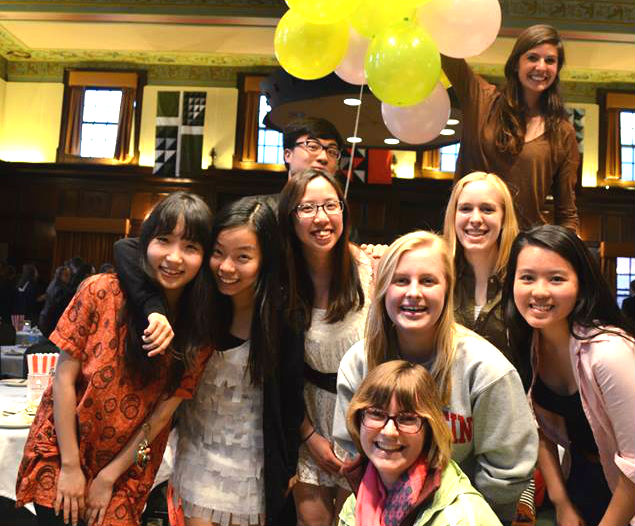
Members of the Global Connections Committee pose at last year’s WUD Banquet. Director Sassi Runger is pictured top right.
TV: What sets your committee apart from other WUD committees and student organizations?
Sassi: Our committee, Global Connections, is unique because of our diverse backgrounds. We have both international and domestic students. The events that we program aim to create a fun and welcoming environment to help bridge the gap between these groups. We pride ourselves in creating opportunities that allow students to interact with others that they normally would not.
Tori: WUD Music is one of the few committees in the entire country that deals with the volume or quality of programming that we have. We’re known as tastemakers, and pride ourselves on booking artists right before they become massively famous (ie. We’ve snagged Run the Jewels, Vampire Weekend, Diplo, Bon Iver, Doomtree, Chance the Rapper, Big Freedia, Matt and Kim, Los Campesinos!, Sharron Van Etten, San Fermin and many more just before they gained national recognition). Not only do we book upwards of 250 shows a year, but we’ve been instrumental in making the Sett, Rathskeller, and Terrace widely recognized as quality music venues for both local and nationally touring acts. Additionally, we give our students an extraordinary amount of influence and responsibility—our advisors are truly just advisors, and it’s a group of amazing students who plan, market and execute every single one of those 250 shows.
Jordan: Students on WUD Performing Arts have a huge responsibility. Unlike any other university theater, our students asked to program the Union Theater’s season and coordinate shows—this gives each student a spectacular opportunity to learn, network and be inspired.
Jack: Society and Politics is a tight-knit group, and because of that we can accomplish a lot. We have anywhere from 10-15 regularly attending members, and we program on a relatively short timeframe—we often turn an idea into an event in two or three weeks. My committee members are also probably some of the most socially aware and politically informed students that I’ve met on UW-Madison campus.
TV: What do you look forward to this year for your committee?
Tori: The year is already coming to a close but we’ve got a killer April lined up for WUD Music before that happens—we’re bringing indie-rock superstars Foxygen on April 10, and on the last weekend of April we’re co-sponsoring an OutFest concert with the LGBT Campus Center to compliment WUD Film’s Reel Love festival. And as always, we’re looking forward to a beautiful summer on the Terrace with music four nights a week—stay tuned for the lineup!
Jordan: Performing Arts has had a large volume of shows, each one being of outstanding quality, and I’m very excited for the shows to come and future programming. I’m also very happy that our committee has gotten larger and shows great enthusiasm for performing arts in the UW-Madison community.
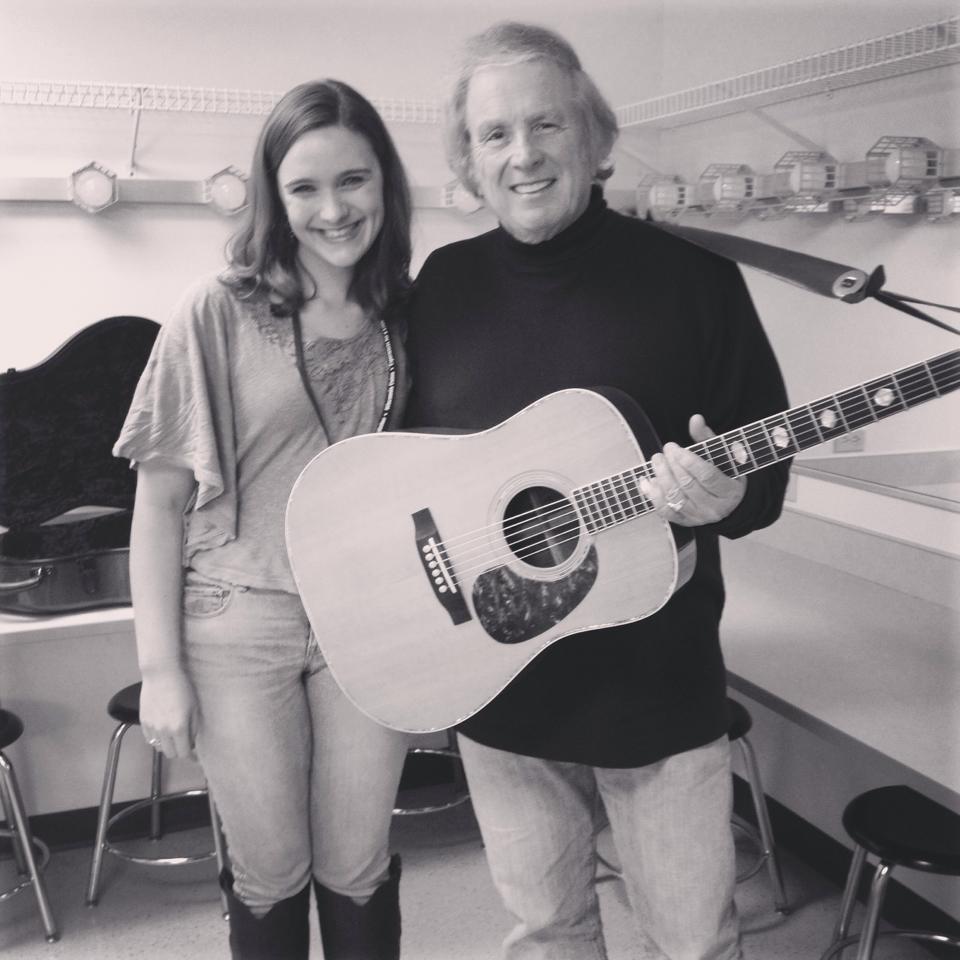
WUD Performing Arts Committee Director Jordan Foster meeting with singer Don McLean.
TV: What skills have you gained while working with WUD?
Sassi: I have learned not only leadership and organizational skills but also how to delegate tasks. It’s impossible to do everything yourself, so you need to be able to advise others how and know when to ask for help.
Tori: Oh man, what haven’t I learned from WUD? Honestly, it’s taught me more than any class I’ve ever taken or any book I’ve ever read. The skills that come immediately to mind are learning how to manage and train people, becoming a master of Google Docs, developing an impeccable filing system for my entire life, getting incredibly good at managing my time, perfecting the art of on-the-fly problem solving and handing more responsibility than I ever thought I could.
Jordan: I’ve gained leadership, confidence, organization, writing skills, marketing skills, promotion, reading riders/contracts and communication. I’ve learned an invaluable sum of values and skills from working for the Wisconsin Union Theater/WUD.
Jack: There are too many to list here, but through my work in WUD my leadership abilities, interpersonal skills and efficiency in time-use have all sky-rocketed. It’s truly an amazing experience; I had no idea as a sophomore in college that I could learn this much outside of the classroom.
TV: What’s your favorite part of being a director?
Sassi: My committee! They’re great people and I love spending time with them while programming.
Tori: There’s so much of it that I love, but the best part is definitely getting to run a committee of some of the most motivated, dedicated and smart people I’ve ever met. My committee members are truly some of the greatest people I know and getting to hang out with them makes my job so easy.
Jordan: My favorite part is meeting artists and going to shows.
Jack: My favorite part of being a director is watching committee members develop over time. We’ve had many members who have joined as bystanders to the discussion at meetings, and throughout the semester have become very active student programmers. It’s a really unique experience to help someone turn their ideas into an event.
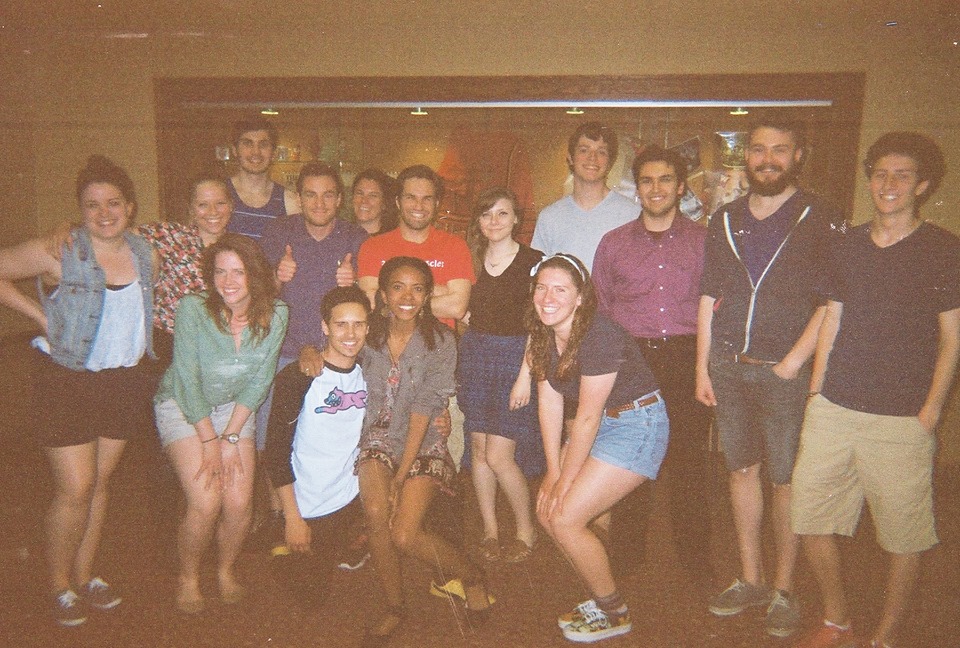
WUD Music members are all smiles!
TV: What’s your dream job?
Tori: I’d love to go on tour with a band someday, manage a big music festival like Coachella or Bonnaroo or work for a touring company. Really anything that allows me to hang out backstage, meet cool people and watch great music from up close.
Jordan: I want to be a nurse (what I’m going to school for)/trumpet player/singer/rockstar/mom.
Jack: That’s still a work in progress, I think something on the legal end of education lobbying.
Were you or anyone you know involved in WUD? Share your favorite experiences in the comments section below and to learn more about WUD click here or visit their individual pages by clicking on the links below.
Alternative Breaks, Art, Distinguished Lecture Series, Film, Global Connections, Hoofers, Memorial Union Entertainment Committee, Music, Performing Arts, Publications, Society & Politics
